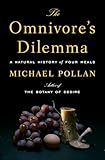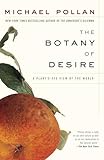From the Department of No Comment.
Author Michael Pollan writes of his experience hunting wild boar, probably as an excerpt from his newly published book:

“The Omnivore's Dilemma : A Natural History of Four Meals” (Michael Pollan)
The Modern Hunter-Gatherer - New York Times Walking with a loaded rifle in an unfamiliar forest bristling with the signs of your prey is thrilling. It embarrasses me to write that, but it is true. I am not by nature much of a noticer, yet here, now, my attention to everything around me, and deafness to everything else, is complete. ....Why boar? The animals were introduced to California by the Spanish in the early 1700's and today are regarded as pests in many parts of the state; it seemed to me easier to justify killing an exotic pest than a native species. Though the pigs have been living wild a long time, they are not technically wild or even full-blooded boar; feral pigs would be more accurate. They are also, by reputation, vicious; one of the nicknames the California pig has earned is “dog ripper.”
When I asked Angelo why he hunted wild pig, he didn't hesitate (or say word one about the environment); rather, he just kissed the tips of his fingers and said: “Because it is the most delicious meat. And there is nothing that tastes so good as boar prosciutto. You'll see. You shoot a big one, and we'll make some.”
and what caught me eye -
...When I could hear Angelo's footsteps no longer, my ears and eyes started tuning in — everything. It was as if I'd dialed up the gain on all my senses, or quieted myself to such an extent that the world itself grew louder and brighter. I quickly learned to filter out the static of birdsong, of which there was plenty at that early hour, and to listen for the frequency of specific sounds — the crack of branches or the snuffling of animals. I found I could see farther into the woods than I ever had before, picking out the tiniest changes in my visual field at an almost inconceivable distance, just so long as those changes involved movement or blackness. The sharpness of focus and depth of field was uncanny, though, being nearsighted, I knew it well from the experience of putting on glasses with a strong new prescription for the first time. “Hunter's eye,” Angelo said later when I described the phenomenon; he knew all about it.I found a shaded spot overlooking the wallow and crouched down in the leaves, steadying my back against the smooth trunk of a madrone. I rested my gun across my thighs and got quiet. The whoosh of air through my nostrils suddenly sounded calamitous, so I began inhaling and exhaling through my mouth, silencing my breath. So much sensory information was coming into my head that it seemed to push out the normal buzz of consciousness. The state felt very much like meditation, though it took no mental effort or exercise to achieve that kind of head-emptying presence. The simple act of looking and listening, tuning my senses to the forest frequencies of Pig, occupied every quadrant of mental space and anchored me to the present. I must have lost track of time, because the 20 minutes flashed by. Ordinarily my body would have rebelled at being asked to hold a crouch this long, but I felt no need to change position or even to shift my weight.
Later it occurred to me that this mental state, which I quite liked, in many ways resembled the one induced by marijuana: the way your senses feel heightened and the mind seems to forget everything outside the scope of its present focus, including physical discomfort and the passing of time. One of the more interesting areas of research in the neurosciences today is the study of the brain's “cannabinoid network,” a set of receptors in the nervous system that are activated by a group of unusual compounds called cannabinoids. THC, the active ingredient in marijuana, is one, and the brain produces its own: a neurotransmitter called anandamide. Whether made by the plant or the brain, cannabinoids have the effect of intensifying sensory experience, disabling short-term memory and stimulating appetite. Scientists still aren't certain what the evolutionary utility of such a system might be. Some researchers hypothesize that the cannabinoids, like the opiates, play a role in the brain's pain relief and reward system; others that they help regulate appetite or emotion.
The experience of hunting suggests another explanation. Could it be that the cannabinoid network is precisely the sort of adaptation that natural selection would favor in the evolution of a creature who survives by hunting? A brain chemical that sharpens the senses, narrows your mental focus, allows you to forget everything extraneous to the task at hand (including physical discomfort and the passage of time) and makes you hungry would seem to be the perfect pharmacological tool for Man the Hunter. All at once it provides the motive, the reward and the optimal mind-set for hunting. I would not be the least bit surprised to discover that what I was feeling in the woods that morning, crouching against a tree, avidly surveying that forest grove, was a tide of anandamide washing over my brain.
But whether I was actually having a cannabinoid moment or not, in the minutes before Angelo's whistle pierced my vigil I did feel as if I had somehow entered nature through a new door. For once I was not a spectator but a full participant in the life of the forest. Later, when I reread Ortega y Gasset's description of the experience, I decided maybe he wasn't so crazy after all, not even when he asserted that hunting offers us our last best chance to leave behind history and return to the state of nature, if only for a time — for what he called a “vacation from the human condition.”

“The Botany of Desire: A Plant's-Eye View of the World” (Michael Pollan)
Tags: drugs, /neuroscience
